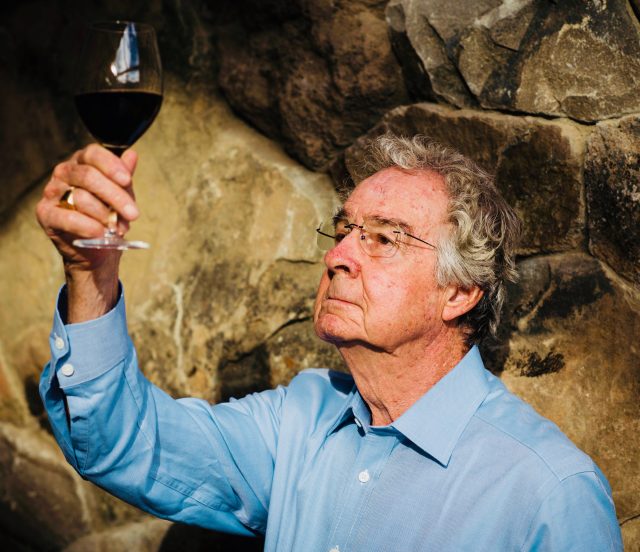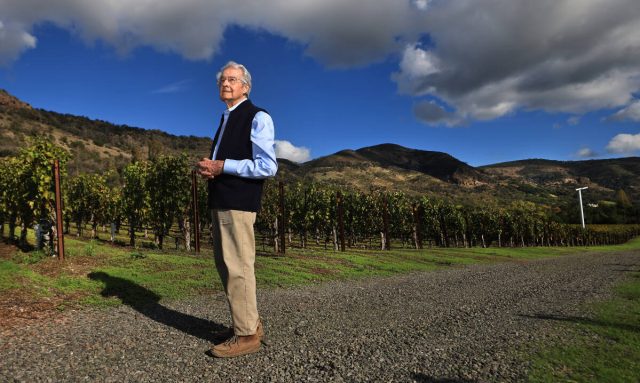This website uses cookies so that we can provide you with the best user experience possible. Cookie information is stored in your browser and performs functions such as recognising you when you return to our website and helping our team to understand which sections of the website you find most interesting and useful.
Napa wine legend Warren Winiarski dies aged 95
Stag’s Leap co-founder Warren Winiarksi died at home in Coombsville on Friday 7 June, just ahead of the production of his 60th wine vintage.

Napa Valley’s Warren Winiarski, whose 1973 inaugural release of Stag’s Leap Wine Cellar Cabernet Sauvignon was judged superior to top French red Bordeaux in Steven Spurrier’s 1976 Judgment of Paris, died on Friday 7 June, at his vineyard home in the Coombsville AVA. He was 95 and had been preparing for his 60th vintage.
Winiarski sold his famous winery in 2007 to Ste. Michelle Wine Estates with Marchese Antinori as a minority partner, although Antinori became sole owner in 2023. However, Winiarski continued to grow grapes commercially at Arcadia Vineyard in the Coombsville AVA until his death. He is survived by his three children.
“What an incredible man and an incredible life, one that truly helped to shape the post-modern Napa Valley,” said John Skupny, proprietor and winemaker of Lang & Reid, on Sunday evening.
“His manner of thoughtful speaking always made you think that what he was saying was profound – and it usually was. With Warren’s departure, it feels like an entire era is slipping away. And he never failed to remind me of my Polish Heritage.”
Winiarski was born in Chicago in 1928 and grew up in its close-knit Polish community. He pursued an academic education in the liberal arts at St. John’s College in Maryland, where he met his late wife, Barbara, and later received a Master’s Degree from the University of Chicago, where he was briefly a lecturer.
Like many Americans who navigated to Napa Valley, travel to Europe convinced the young Chicagoan he might make wine instead of pursuing an alternate career.
In 1964, he had his first wine job as Lee Stewart’s sole apprentice at Souverain Cellars. As the second man in a two-man operation, Winiarski said he “spent his days working over wine vats and his nights poring over books about winemaking”.
Then in 1966, while Robert Mondavi’s son Michael was serving in the military reserve, Winiarski became his assistant winemaker at the new Robert Mondavi Winery. After a two-year hitch, he took a sojourn to make wine in Colorado, becoming the first person to successfully plant vinifera grapes in that state.

Stag’s Leap
In 1970, Winiarski and several investors bought a 44-acre prune orchard at the edge of Napa Valley’s eastern mountains near Yountville and replanted it to Cabernet Sauvignon and Merlot vines. They named their new property, Stag’s Leap Vineyard, or S.L.V.
In 1972, the family and a group of partners—some new, some from the vineyard partnership—bought a second parcel nearby as a winery site, and Stag’s Leap Wine Cellars opened its doors in 1973.
Three years later, the success of Winiarski’s Cabernet and the Barrett family’s Château Montelena Chardonnay over their French counterparts is rightfully credited with giving Napa Valley an instant worldwide fine-wine legitimacy which lasts until today.
“I can’t think of a better guy and outfit to get partnered with at the Paris tasting than Warren and Stag’s Leap,” Bo Barrett told db upon hearing of Winiarski’s passing.
“For the ensuing decades of celebrations of the event, we always enjoyed collaborating. He was a different kind of pioneer. My dad [Jim Barrett] always called him ‘The Professor.’”
In addition to Winiarski’s contributions in the vineyard and in the winery to Napa Valley’s wine reputation, he and his family also were very active in their support of wine industry activities and various causes. Winiarski was a crusader for wine quality, appearing frequently in symposia around the world and publishing articles in several wine journals.
In 1996, Warren and Barbara Winiarski initiated and provided generous support for an oral history and documentation for the Smithsonian National Museum of American History’s American Food & Wine History Project.
Services for Winiarski will be held privately and by invitation only.

